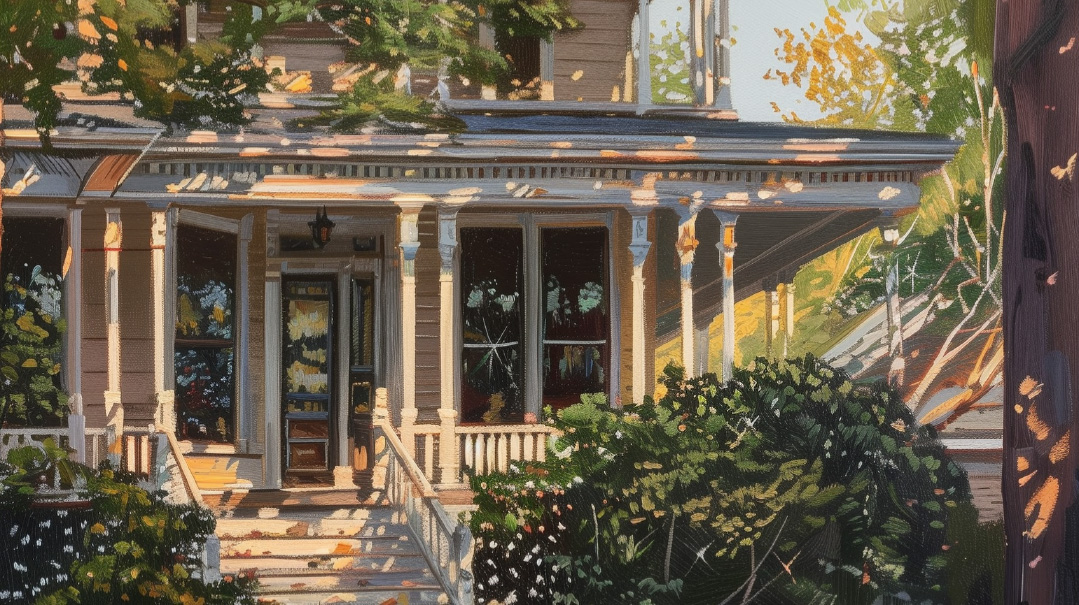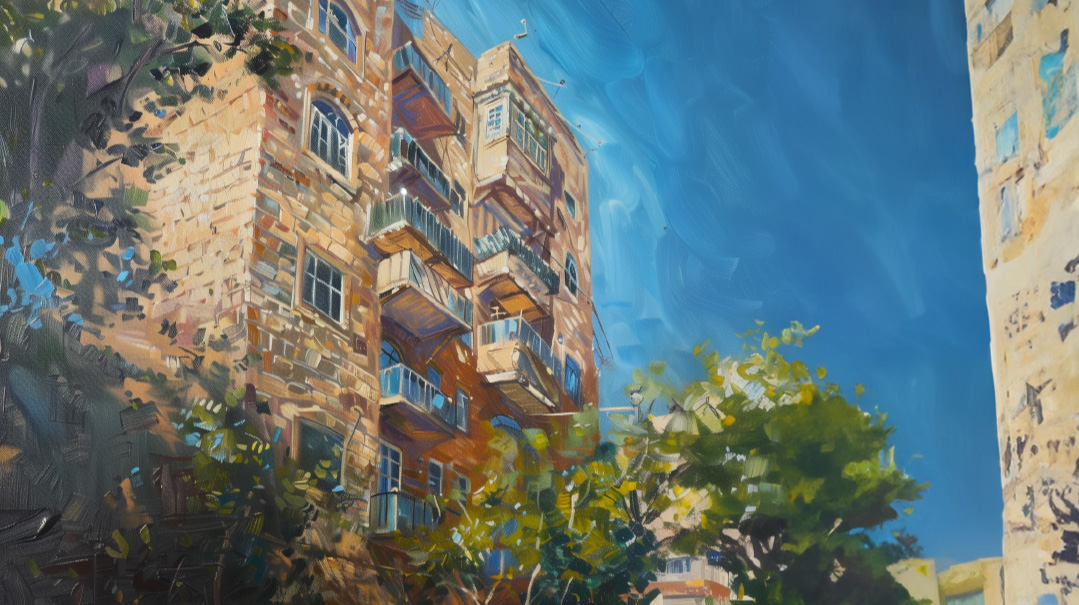Shift Down South
| April 16, 2024“I can’t imagine what it would have been like to raise our children in any other city”

As told to Russy Tendler by her grandmother Rebbetzin Estelle Feldman
I
could hear the train pulling out of the station below me, leaving this Orthodox “Yankee” girl in the deep South. In front of me were two clearly marked drinking fountains. Above one, there was a sign that read “Colored,” and next to it, a sign that boldly proclaimed: “White.” I felt like I’d been punched in the stomach. I don’t know why I was so surprised; this was the segregated South in 1952, after all. It was the literal law of the land. I wanted to turn around and bolt down the steps, calling to the train, “Wait for me, wait!” But the train was quickly disappearing from sight, and I was standing on solid ground, officially here to stay as the new rebbetzin of Beth Jacob Synagogue in Atlanta, Georgia.
I grew up in Boro Park, surrounded by cousins and friends. We were a very close family. I’d never been beyond the Hudson River, much less hundreds of miles away to a state we only knew about from Gone with the Wind.
When I was engaged to be married, an unusual opportunity presented itself to my chassan, Reb Emanuel. There was a position open in a small congregation in Atlanta. It offered the chance to venture out as a real pioneer. At the same time, he’d been offered a position as assistant rabbi at a prominent shul in the Bronx. This post was merely a subway ride away from my current home. Reb Emanuel was willing to accept it; he told me if it was what I wanted, he would take the job in the Bronx. But something about it just didn’t feel like the right fit for him, didn’t speak to him the way the call of Atlanta and its host of unknowns beckoned.
“What does your father think?” I asked Reb Emanuel one day as we spoke about our fast approaching future as a married couple. He looked at me, and with conviction, responded, “My father and I both think I’d do better going out on my own than becoming an assistant rabbi.”
He also had a very close connection with his rebbi, Rav Yaakov Yitzchok Ruderman, who encouraged him to accept the position in Atlanta.
“Then that’s what we’ll do,” I responded, and I meant it with all my heart.
I was becoming a wife, and a wife goes where her husband goes and supports him in his growth. There was no question in my mind. “And besides,” I’d tell myself, any time a slight bit of doubt allowed itself to creep up in the back of my mind, “it’s only for two years. I can do anything for two years.”
My parents were saddened that we’d be going so far away, but they fully supported our decision.
My brother warned me that there were no furniture stores in Atlanta. I didn’t have enough information to combat this supposition, but I hoped it wasn’t true.
We were to be married in November, but Reb Emanuel needed to begin his position as Rabbi of Congregation Beth Jacob at the beginning of the Jewish year, in time to lead the congregation for the High Holidays, so that meant a few months of long-distance engagement. We’d write to each other, and once in a while we’d have a quick phone call, but the long distance then was Loooong Distance, “with a capital “L” and a capital “D,” as I would later tell my grandchildren.
During one of our short but cherished phone calls, my chassan asked to put someone on the phone. He was staying in a room at the home of the Greenfields, an elderly couple who had already been in Atlanta for 50 years. They were one of very few couples who were shomer Shabbos and kept kosher.
Mrs. Greenfield got on the phone.
“Hellooooo, honey,” came her drawl across the line, her English slow and Southern, but with a detectable twinge of a Yiddish accent. She couldn’t have been a more charming introduction to our new home.
As the congregation began to get to know my soon-to-be husband, they looked forward to the arrival of his young bride.
“Does she play cards?” they asked him eagerly.
“No,” was his matter-of-fact response.
“Mah-jongg?’ they posed.
“I’m afraid not,” was his answer.
“Then what is she going to do here?!” they asked with growing concern. “What will she fill her days with?”
When we disembarked from the train at Brookwood station in Atlanta, a large committee greeted us. The shock of the water fountains in front of me would have to be put aside for right now; I had new acquaintances to meet, new friendships to form, and a new role to play.
I turned toward the friendly group of faces and felt immediately welcome, though it took me quite some time before I could fully decipher their Southern-accented words.
There was a lot to get used to in the city we now called home. I missed the constant interaction with cousins and friends. I was only 20 years old, and there was no one under the age of 40 in our congregation, no contemporary who I could really relate to. In many ways, I was very much alone. And yet, at the same time, I felt doted on, revered, and loved by the community members. And all along, we felt that our decision to start out in this wonderful community was the right thing for us.
Hosting and cooking was different than it likely would have been back in Boro Park. There was a shomer Shabbos shochet, and we were able to get chickens from him. I had to bring home the chickens, salt and soak and clean them before preparing them for Shabbos.
As far as meat was concerned, my husband found that the local meat shechitah left much to be desired. My dear father, a shochet, sent us a freezer truck with an entire side of beef, all cut up and packaged, ready to cook. He’d send a truck every few months, and sometimes the meat would arrive defrosted and barely cold, which meant I needed to cook it all at once. It was quite an undertaking!
“I have a job for you,” my husband said one evening. “There have been some murmurings about the kosher butcher store on Ponce De Leon Avenue. A few people suspect they saw the owner working there on Shabbos.” The hechsher would need to be revoked if this was the case.
“The butcher recognizes me already,” Reb Emanuel explained, “so I can’t be the one to check in on the store. I need you to walk past on Shabbos and see if our suspicions are well-founded.”
It was a cold December Shabbos afternoon when I made the ten-minute walk over to the butcher shop. I bundled myself up as I prepared to play “spy.” Sure enough, the lights were on, and I saw the owner moving back and forth, clearly preparing for the week. I reported my findings to my husband, who had to forbid him from selling meat and chicken. The local rabbis said he could still sell groceries, as they didn’t want to put him out of business completely.
Speaking of grocery stores — that was another adjustment for me. Back home in Boro Park, groceries lined the street corners every few hundred feet. In Atlanta, I needed to become a patron of large supermarkets.
There were new “creatures,” too, that I had to get used to, like the large cockroaches that appear in the humid summers, and the snakes. I’ll always remember the time my children were playing on the lawn when they saw a poisonous copperhead snake. I knew Reb Emanuel was in a meeting and couldn’t be disturbed. Panicked, I called the first person I could think of — the shul president. Within minutes, he showed up yielding a shovel! I still can hear that sound of the “ping” as the snake turned its head and bit the shovel with all its force. The shovel dropped and the snake slithered off into our backyard. I then called the police department who sent out a state officer who held his gun at ready as he went out looking for the snake. I asked him how on earth he was going to shoot a slim snake even if he found him, and his answer stays with me to this day. “Why, Ma’am,” he drawled, “I’d just get him in my sights, move back an’ forth and back an’ forth with the gun till he’s mesmerized an’ right with it — then shoot!” He never did find him, and I didn’t let the kids play in the backyard for several weeks afterward.
Our community knew that as the rebbetzin, I always had a hat or a turban on my head (wigs hadn’t yet made their debut in the frum world). They all knew I dressed differently to them and accepted it as a matter of fact, never commenting. I had a background in fashion, as I had attended FIT with the lofty dreams of one day moving to Eretz Yisrael and founding a modest and beautiful fashion line. I liked to think that my fashion sense helped me to be more relatable. Regardless of the fact that I dressed differently, I was fully embraced and accepted by the women of Atlanta. This is what they wanted from their leadership, and it strengthened me to be that example for them.
The local mikveh, located on the other side of town where an Orthodox synagogue had once existed, was an old, “haunted” house. Of course, it wasn’t used very often, and my husband had to check its halachic status and ensure that all leaks were patched. This, too, was quite the contrast to the multiple mikvaos available in Boro Park. But what wasn’t a reminder of the stark contrast between our “old” life and our new one?
With each year that passed, we saw the members of the community grow more and more. Two years turned into three, three into four. How could we leave when we were seeing so much progress? We had a new building, a new mechitzah, and it had all been a labor of love and mutual respect. Somehow, without even realizing it, Atlanta had become our home. It was where we belonged — for now.
Early on, we’d been worried about raising children in a city so far from family and with so few educational resources. That was the impetus for us opening an elementary school, The Hebrew Academy. My husband, together with some dedicated community members, worked to start a kindergarten where Jewish children could learn both secular and Jewish studies. During the first year of the school, I taught Jewish studies to the little kindergarteners alongside an experienced English teacher. I was expecting my first child at the time. The hope was that as the classes rose, the student body would increase. And indeed, that is what happened.
Years turned into decades, and I found myself wondering how we’d made it this far. But this had become our mission, and the community had become like family. We had real affection for all the members. We respected and admired every change they tried to implement in their lives, no matter how seemingly small.
And while I became deeply connected with everyone, there was always an unspoken boundary that left me acutely aware of my status as a rebbetzin. This wasn’t like my friendships growing up. I couldn’t share everything the way I would with friends from back home. Of course, we couldn’t eat at anyone’s house and couldn’t allow our children to have anything more than a cup of water at their friends’ houses. But these relationships were something different, something powerful and beautiful, something that pushed us to expand ourselves. While staying in touch with friends from back home was very difficult, I did keep up with one or two close friends by writing as often as possible.
It was a matter of fact for our children that we were different than those around us. Our three oldest were all yarmulke-bearing boys, and they were recognized wherever they went as the “rabbi’s sons.” Eventually, as the grades in the Hebrew Academy rose and more boys learned about yarmulkes, they were no longer the only ones wearing them. While we were careful never to push expectations that would stifle and intimidate them, our children were cognizant of their status as the rabbi’s family on their own. The awareness created a certain strength of character that we felt we likely couldn’t have fostered had we raised them anywhere else. They had a sense of pride and independence. They grew up unspoiled; there was no peer pressure, no desire to outdo anyone else, and no need to keep up with the latest styles or competitions that sometimes exist in the broader frum world.
The children weren’t the only ones who bore the responsibility of standing as a pillar of solid faith. A woman once told me they’d missed me at a Sisterhood meeting the previous week.
“I was sorry to miss it,” I smiled, “but I know you got along just fine without me!”
“Actually, we didn’t really, “she said, laughing slightly. “We all behave much better when you’re present!”
When sheitels hit the market, I wanted to try one. I remember the day I wore a wig for the first time, and my concern that our congregants wouldn’t know it was a wig.
“They’ll know it’s not your hair,” my husband assured me. “They know you well enough to be confident that it’s a wig.” We attended a large Israel Bonds event that night. Sure enough, the members of our shul seemed completely comfortable with my new wig. But a man from the Conservative shul approached me at the end of the evening. “Mrs. Feldman, I have to ask…” he shifted uncomfortably, but went on, “all these years that I’ve known you, you’ve covered your hair, and I admired you for it. What happened?”
When I responded that I was so happy he asked, and that I was, indeed, wearing a wig, he breathed a sigh of relief. It was always ironic to me that even for those who were nonobservant, my own observance was of the utmost importance.
AS I look back now, some 70 years later, I marvel at the path Hashem paved for our family. I can’t imagine what it would have been like to raise our children in any other city. I wince to think of all I would have missed; we relished the challenges and victories and courage and faith we were privy to observe throughout our years there.
It took a certain amount of flexibility, and a trust that Hashem would help us in what we hoped would be “holy work.” It took Hashem’s support in every single endeavor, and His wish for us to succeed. It took a good, old-fashioned sense of loyalty, an open heart and an open mind. It took making sacrifices that turned out to be the biggest gifts of all.
When we return to visit our shul, we can still sense the same welcoming and open environment from back when we arrived in 1952. It’s still “the Orthodox synagogue for all Jews.” I look around the sanctuary, and think of the many years and seasons of life that have passed. We have extraordinary nachas from all that the community has become, and we know that Beth Jacob stands as an iconic community of Torah, unity, and spiritual growth. It’s especially meaningful that our son has had the zechus to be the rav of Beth Jacob for many years and that some of our offspring have made Atlanta their home. Some of our grandchildren and great-grandchildren walk the same paths our own children did as they grew up.
Under Hashem’s guiding hand, this young Yankee girl transformed into a true Southerner, and what once felt like a strange place became etched in our hearts as home.
(Originally featured in Family First, Issue 890)
Oops! We could not locate your form.




